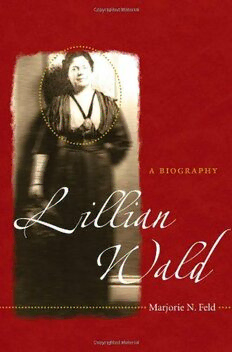
Lillian Wald: A Biography PDF
Preview Lillian Wald: A Biography
Lillian Wald The University of North Carolina Press chapel hill Lillian WaMalrjoride N. Feld a b i o g r a p h y ∫ 2008 The University of North Carolina Press All rights reserved Manufactured in the United States of America Designed by Courtney Leigh Baker Set in Scala by Keystone Typesetting, Inc. The paper in this book meets the guidelines for permanence and durability of the Committee on Production Guidelines for Book Longevity of the Council on Library Resources. The University of North Carolina Press has been a member of the Green Press Initiative since 2003. Library of Congress Cataloging-in-Publication Data Feld, Marjorie N. Lillian Wald : a biography / Marjorie N. Feld. p. cm. Includes bibliographical references and index. isbn 978-0-8078-3236-3 (cloth: alk. paper) 1. Wald, Lillian D., 1867–1940. 2. Feminists—New York (State)—New York—Biography. 3. Social reformers— New York (State)—New York—Biography. I. Title. hq1413.w34f45 2008 361.3092—dc22 2008019176 12 11 10 09 08 5 4 3 2 1 Contents Acknowledgments vii Introduction: Claiming Lillian Wald 1 chapter 1 Wald’s Hometown Lessons: From Rochester to Manhattan 19 chapter 2 The Woman at the Head of the Table: Negotiating Universalism and Di√erence at Henry Street 53 chapter 3 Universal Peace and Brotherhood: Wald’s Internationalist Vision 91 chapter 4 The Society We Might Be Living In: Modern Challenges to an Ethnic Progressive Vision 123 chapter 5 Windows Opened Upon a Moving World: New Deals and Old Faiths 161 Conclusion: She Is All Religions: Wald’s Enduring Legacies 187 Notes 203 Bibliography 261 Index 287 Illustrations Lillian Wald’s 1891 yearbook photograph from the New York Hospital Training School for Nurses 34 Jacob H. Schi√ and his wife, Therese Loeb Schi√ 39 1908 planning meeting for the National Federation of Settlements 56 Henry Street visiting nurses leaving an old settlement building early in the twentieth century 60 Calligraphy design of the Chinese character Bao (brotherhood) 99 Wald at the height of her career, ca. 1915 100 ‘‘House on the Pond’’ 165 Photo pasted into a booklet given to Wald on her birthday in March 1933 179 Wald’s gravestone at Mount Hope Cemetery in Rochester, New York 184 Acknowledgments I have traveled with Lillian Wald for a long, long time and have been lucky to have had the assistance of many helpful people along the way. Kathryn Kish Sklar first introduced me to Wald when I was an undergraduate at the State University of New York at Binghamton. She and Allan Arkush guided me through a senior honors thesis on Wald there. At Brandeis University, I had the sound advising of Joyce Antler and Morton Keller. The summer before I began my graduate work, I secured a job at Henry Street Settlement, which Wald founded in 1893. I headed the Greening Challenge, a summer recycling program. My students that summer taught me about urban life, and I am grateful to them; my boss, Christine Koenig, taught me about politics, reform, and professionalism. She and Catherine Cul- len, both open about their admiration of Wald, gave this project momentum by alerting me to the role set- tlements can still play in urban transformation. Every historian is indebted to talented librarians, archivists, and administrators. Jim Baillie at Brandeis and Barbara Kendrick, Kate Buckley, and Hope Till- man at Babson found me the sources I needed on so many occasions. Sari Weintraub at Henry Street, Mi- chael Delaney and John Belleci at the Visiting Nurse viii acknowledgments Service of New York, and Laurie Deredita at Connecticut College, along with Mary Driscoll, Pat MacAlpine, and Sheila Dinsmoor at Babson, o√ered crucial assistance to me at various stages of this manuscript’s preparation. I am truly grateful to colleagues who took time to share their thoughts and suggestions with me over the years: Jonathan Sarna, Riv-Ellen Prell, Jane Kamensky, Kandice Hauf, Daniel Soyer, Louis Kampf, Saul Slapiko√, Tom Dublin, Kathryn Kish Sklar, David Engerman, Michael Staub, Rachel Rubin, and Erica Rand. For allowing me forums for my work, I thank Debbi Simonton at the Women’s History Magazine and Maureen Flanagan at the Journal of the Gilded Age and Progressive Era. Conversations with Leo Nevas helped me map out the landscape of Westport, Con- necticut. Annie Polland and Miriam Leberstein combed the Yiddish archives for Wald and Henry Street and then helped me theorize why she simply wasn’t there. This work benefited immeasurably from a semester spent writing and research- ing, a√orded by a grant from the Babson Faculty Research Fund. A Koret Foundation Jewish Studies Grant helped make the illustrations possible and assisted in this book’s publication. I also thank Chuck Grench at the University of North Carolina Press for shepherding this manuscript through to its completion. Friendships have helped to make these years enjoyable. For their friendship, I thank Tobin Belzer, Ellen Tanowitz, Ann Trinh, Jenna Tranh, Missi Diamond, Meenakshi Khanna, Michelle Cheeseman, Julia Resnitsky, Ankit Jain, and the board of Radical Teacher. At Babson, Je√ Melnick has been a great friend and mentor and a reminder that juggling parenting, politics, teaching, and research is possible. I’m also grateful to Kevin Bruyneel for his warm friendship and calm advice. I thank my family for their support and encouragement: Arthur and Eena Feld; Debra, Greg, and Rubin Harris; Marvin and Soni Feld; Sunny and Maier Fein; Matt, Lisa, and Corey Fein; and Joseph and Sylvia Fein. The memory of my mother, Rosalind Sperling Feld, never fails to inform all that I do. My husband, Michael Fein, brings light to every one of my days. Our sons, Izzy and Nathan, know little of Wald, but their beauty, sweetness, and grudging accep- tance of ‘‘Mommy’s work’’ bring me great happiness. I have traveled far from my own hometown, and they have shown me just how joyful life can be. Lillian Wald
